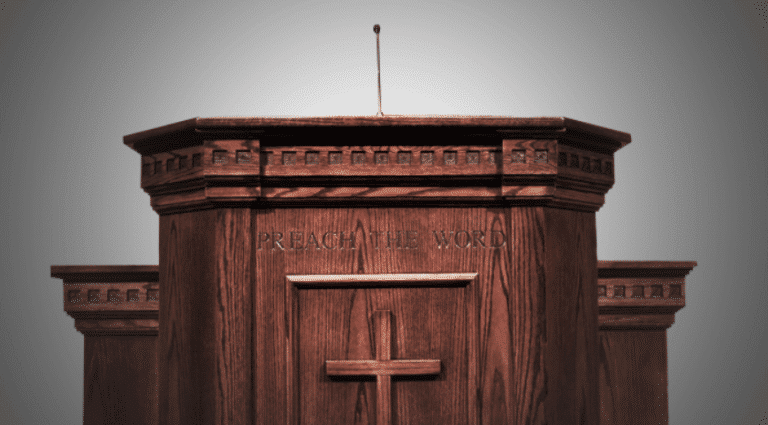When I was a teenager, and then again as a young adult, I spent a lot of time working for my Dad, who owns a construction company and builds houses for a living. I have many fond memories of working with my Dad over the years, from funny stories to the multitude of projects we completed together. While working on one particular home, my Dad gave me the responsibility of cutting several boards all to the same length. He set me up with some sawhorses and a circular saw, and then he gave me a pattern to use, which was a board he had cut with specific measurements and angles.
As I began to cut each of the boards, one after another, it dawned on me, in all my youthful wisdom and years of carpentry experience (insert sarcasm here), that the process would go much faster if I would simply use the previous board as my pattern for the next piece. In other words, why did I need to keep reaching for the pattern when I had a perfectly good piece right there in my hands? Well, it didn’t take long for me to complete the job, and I proudly let my Dad know that I was finished.
However, as we began to use the boards I had cut, there was a problem. The boards were all coming up short. My Dad, in that moment, conveyed in his own not-so-subtle way, that I had messed up. Then, after letting me know of my error, he asked me a question: “Son, didn’t you use the pattern I gave you? Kevin, I gave you a pattern to follow. Why didn’t you follow it?”
I’ll never forget the principle I learned from that experience. Sometimes it seems easier to bypass the pattern we’ve been given in order to more quickly reach a desired end, only to realize that the corners we cut were crucial. As it applies to the Church of Jesus Christ, we have been given a pattern to follow. We’ve been given a blueprint, if you will, from our wise Father, who is the Master Builder (Heb 3:4). That blueprint is sound doctrine. Therefore, instead of thinking that we are wiser than God by creating strategies and programs that bypass the biblical blueprint, we simply need to devote ourselves to the pattern we’ve been given in God’s Word.
As it pertains to the health of the local church, this aspect is critical. In order for a church to be healthy and thriving, it must have a genuine, whole-hearted commitment to sound, biblical doctrine. Among the many places in Scripture we see this emphasized, 1 Timothy is certainly one of them. Paul had previously left his son in the faith, Timothy, in Ephesus to do the work of a pastor. In the book of 1 Timothy, he writes to encourage young Timothy in the faith and to remind him of the task to which he has been called.
Faithful Pastors Teach Sound Doctrine
The Apostle Paul begins his Spirit-inspired letter to Timothy, by saying:
Paul, an apostle of Christ Jesus by command of God our Savior and of Christ Jesus our hope, To Timothy, my true child in the faith: Grace, mercy, and peace from God the Father and Christ Jesus our Lord (1 Tim 1:1–2).
Although the first two verses of this letter include Paul’s customary, introductory greeting, his words are saturated with his general affection for Timothy. He’s writing to his beloved disciple and partner in the gospel, and he’s doing so with the church of Ephesus in mind. This is part of the reason he identifies himself as an apostle. It’s not as though Timothy was ignorant of Paul’s apostleship. Rather, Paul’s apostleship carried with it a certain level of authority. In fact, to be an apostle of Christ, in this sense, meant that Paul was commanded and sent by Christ himself. Since Timothy was dealing with the issue of false teaching in the Ephesian church, especially among its leadership, it was important that Paul’s apostolic authority be established. By doing so, Timothy could teach the church and rebuke false teachers by appealing to the authority of God. Why? Because biblical authority is divine authority.
This is also why, even in his introductory greeting, Paul emphasizes and teaches sound doctrine. He writes of God being our Savior and of Christ Jesus being our hope. Yet, to speak of God as our Savior necessitates that we have been saved from something, namely, our sins and God’s wrath. Also, to have Christ as our hope necessitates that we have a confident expectation of something found in Christ, namely, salvation and eternal life. Furthermore, what is it that we receive from God, our Savior, and Christ Jesus, our Lord and our hope? Paul tells us: Grace, mercy, and peace.
- Grace is the unmerited favor of God by which he blesses us, as Paul wrote to the Ephesian church just a few years earlier, “with every spiritual blessing in the heavenly places” (Eph 1:3).
- Mercy is the undeserved kindness of God by which he holds back what we deserve and places it upon Christ in our stead (1 Tim 1:16).
- Peace refers to the reconciliation we now have with God and one another because of what Christ has done for us on the cross (Col 1:20).
More than just an introductory greeting, this is sound doctrine. It is the precious truths of Scripture that are sufficient for all things pertaining to life and godliness (2 Pet 1:3). Therefore, if we are going to fulfill the calling God has placed upon our lives, we must teach our people sound doctrine.
Faithful Pastors Defend Sound Doctrine
Amid the church conflict and false teaching that was taking place in Ephesus, it seems that Timothy was tempted, as all men would be, to leave the Ephesian church and to devote himself to a new place of gospel ministry. Paul, however, exhorts Timothy to stay, because he knows that the only remedy for false teaching is sound doctrine:
As I urged you when I was going to Macedonia, remain at Ephesus so that you may charge certain persons not to teach any different doctrine, nor to devote themselves to myths and endless genealogies, which promote speculations rather than the stewardship from God that is by faith (1 Tim 1:3–4).
Though false teachers are often few in number, they have the ability to do great damage to the church. With no regard for the truth, they spread their lies and slander those who pose a threat to their false teaching. With no regard for unity, they cause division in the church and enjoy starting controversy. And, with no genuine affection for true believers, they care only about what benefits themselves. Like a cancer, if left unchecked, the damage caused by false teachers will spread through the body, until it eventually dies.
Realizing the seriousness of this danger, Paul pleads with Timothy not to leave his post. The purpose for his persistence, of course, is that Paul wants to see the Ephesian church be healthy. Therefore, he extends his apostolic authority and asks Timothy to stand upon it with boldness in order to charge the false teachers to stop and to warn them against teaching anything that does not accord with Scripture. Like Paul’s instructions to Timothy, faithful pastors recognize the divine charge they’ve been given by God to tenaciously uphold and defend sound doctrine.
Faithful Pastors Love Sound Doctrine
In the midst of the weighty responsibility to uphold this sacred trust, Paul goes on to provide Timothy with the overarching aim, or goal, of our pastoral charge:
The aim of our charge is love that issues from a pure heart and a good conscience and a sincere faith (1 Tim 1:5).
Throughout Scripture, there is a consistent emphasis upon the balance between truth and love (John 1:14). Truth without love is cold, mechanical orthodoxy. It’s like having a backbone with no heart. It’s standing up straight, but it’s dead. On the other hand, love without truth is nothing more than a shallow façade of sentimentality with no substance. It’s like having a heart with no backbone. It might be alive, but it bends and falls whichever way the wind blows. Thus, our goal is to maintain both.
For this reason, Paul wants Timothy to understand, amid all the conflict he’s contending with, that no matter what needs to be accomplished within his pastoral commission, it must be done from a pure heart. There must not be any ulterior motives or selfish agendas. His pastoral charge must be carried out with a good, clear conscience before the Lord. And, it has to be accomplished in sincerity of faith, which is a genuine confidence that our actions are in accordance with the will of God, which is determined from the Word of God.
In contrast to the false teachers who, through their words and actions, demonstrate the hatefulness of their heart, the condemnation of their conscience, and the falseness of their faith, Paul reminds Timothy that his words and actions must be done in love, flowing from purity, sincerity, and faith. There is no doubt that this can be extremely difficult. For example, although it may not seem loving, genuine love sometimes requires us to do hard things. It may require a rebuke, as Paul is emphasizing to Timothy. In other instances, such as dealing with those who persist in false teaching, it may require further levels of church discipline, even to the point of excommunication. After all, if we aren’t willing to take the necessary steps to protect the church, for fear that people won’t like us or that they will perceive us as being unkind, then we really need to question whether we genuinely love God, his Word, and his people, at all.
To use the analogy mentioned above, imagine visiting your doctor, because you have an aggressive form of cancer. As you sit in his office, the doctor walks in with a big smile on his face. His words seem kind, and he appears to be a very nice man. However, instead of talking about your cancer, he proceeds to talk about the weather. He asks how your family is doing and what your plans are for the holidays. Then, he turns and prepares to leave. Before he walks out the door, you quickly say, “But doctor, what about my cancer? What are we going to do about it?” The doctor responds, with that same smile on his face, saying, “Well, hopefully it stops spreading. Have a great day!” He then walks out of the office, leaving you sitting there, as the cancer continues to ravage your body, with no hope for health and no strategy for ridding your body of this terrible disease.
Everyone would acknowledge that a doctor who acted in such a ridiculous manner should be stripped of their license for medical malpractice. How could a doctor like that possibly claim to care for his patients? To stand by idly while those under your care are dying is both apathetic and cruel. Yet, the same can be said, to an even greater extent, for pastors who do not love sound doctrine enough to rid the body of Christ of false teaching. In order to fulfill the aim of our charge, then, we must be fully convinced that our churches desperately need the Word of God. Our confidence must be found in the truths spoken to us from the mouth of God, given to us by inspiration of the Spirit of God, and passed down to us by the apostles and prophets of God.
As we strive to be faithful pastors, may we recognize the absolute necessity of sound doctrine. May we teach it, may we defend it, and may we love it!




